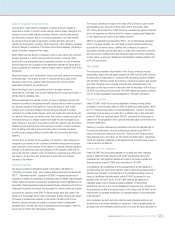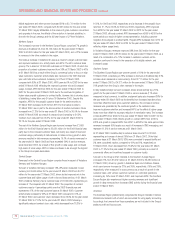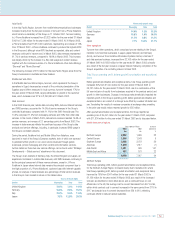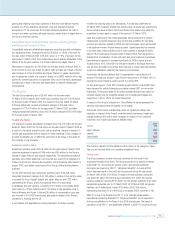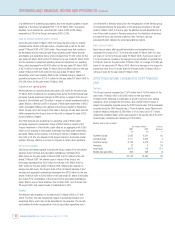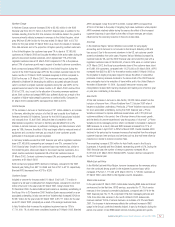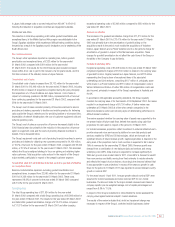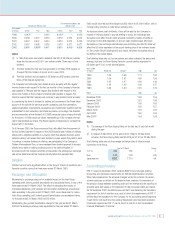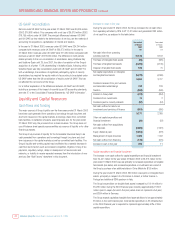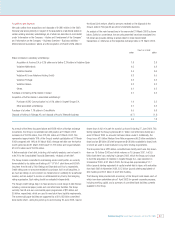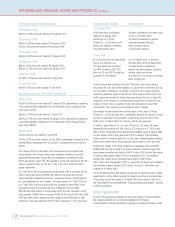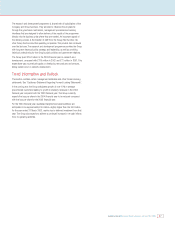Vodafone 2003 Annual Report Download - page 41
Download and view the complete annual report
Please find page 41 of the 2003 Vodafone annual report below. You can navigate through the pages in the report by either clicking on the pages listed below, or by using the keyword search tool below to find specific information within the annual report.
Vodafone Group Plc Annual Report & Accounts and Form 20-F 2003 39
In Japan, total average costs to connect reduced from ¥39,047 to ¥34,145
following the reduction in acquisition incentives and equipment subsidies.
Middle East and Africa
The reduction in total Group operating profit, before goodwill amortisation and
exceptional items, in the Middle East and Africa region was attributable to the
Group’s Egyptian subsidiary which experienced difficult trading conditions during
the period as a result of the Egyptian pound’s devaluation, and a weakening of the
South African rand.
Non-mobile businesses
The Group’s other operations reported an operating loss, before goodwill
amortisation and exceptional items, of £323 million for the year ended
31 March 2002, compared with £281 million for the year ended
31 March 2001. The results for the 2002 financial year included increased
losses within Arcor, due in part to the inclusion of a full year’s results, and the
first time inclusion of the statutory losses of Japan Telecom.
Consolidated cost of sales
Consolidated costs of sales increased from £8,702 million for the year ended
31 March 2001 to £13,446 million for the year ended 31 March 2002, including
£3,554 million in respect of acquisitions completed during the year, principally
the acquisitions of J-Phone Vodafone and Japan Telecom. Cost of sales in
respect of continuing operations, £9,892 million, represented 55% of turnover
from continuing operations for the year ended 31 March 2002, compared with
58% for the year ended 31 March 2001.
The Group’s cost of sales consisted primarily of financial incentives to service
providers and dealers, payments to landline and mobile operators for delivering
calls outside the Group’s networks and for providing landline or microwave links,
depreciation of network infrastructure, the cost of customer equipment sold and
network operating costs.
The Group’s cost of sales as a proportion of turnover decreased slightly in the
2002 financial year due primarily to the reduction in the proportion of turnover
spent on equipment costs and the costs of providing financial incentives to
dealers. This is discussed below.
The Group’s equipment costs and cost of providing financial incentives to service
providers and dealers for obtaining new customers amounted to £4,160 million,
or 18.2% of turnover, for the year ended 31 March 2002, compared with £3,364
million, or 22.4% of turnover, for the year ended 31 March 2001. This decrease
reflects the Group’s realigned strategy to focus on gaining and retaining higher
value customers. Total acquisition costs reduced in the majority of the Group’s
major markets, particularly in respect of the prepaid customer segment.
Consolidated sales and administrative expenses, excluding goodwill amortisation
and exceptional items
Sales and administrative expenses, excluding goodwill amortisation and
exceptional items, increased from £2,980 million for the year ended 31 March
2001 to £4,328 million for the year ended 31 March 2002. These costs
represented 18.9% of turnover for the year ended 31 March 2002 compared
with 19.9% for the year ended 31 March 2001.
Operating loss
The total Group operating loss of £11,834 million for the year ended
31 March 2002 compared with a total Group operating loss of £6,989 million for
the year ended 31 March 2001. The results for the year ended 31 March 2002
are stated after goodwill amortisation charges of £13,470 million compared
to £11,873 million for the year ended 31 March 2001 and after charging
exceptional operating costs of £5,408 million compared to £320 million for the
year ended 31 March 2001.
Goodwill amortisation
The increase in the goodwill amortisation charge from £11,873 million for the
year ended 31 March 2001 to £13,470 million for the year ended 31 March
2002 was primarily due to the amortisation of goodwill arising on the
acquisitions made in the period, most notably the acquisitions of Vodafone
Ireland, Japan Telecom and J-Phone Vodafone and to a full period’s charge for
amortisation of goodwill in respect of the Mannesmann acquisition. These
charges for goodwill amortisation do not affect the cash flows of the Group or
the ability of the Company to pay dividends.
Exceptional operating items
Exceptional operating costs of £5,408 million for the year ended 31 March 2002
comprised impairment charges of £5,100 million in relation to the carrying value
of goodwill for Arcor, Cegetel, Iusacell and Japan Telecom, and £222 million
representing the Group’s share of exceptional items of its associated
undertakings and joint ventures, comprising £107 million of, principally, asset
write downs in J-Phone Vodafone and £115 million of reorganisation costs in
Verizon Wireless and Vizzavi. A further £86 million of reorganisation costs was
also incurred, principally in respect of the Group’s operations in Australia and
the UK.
In accordance with applicable accounting standards, the Group regularly
monitors the carrying value of its fixed assets. At 30 September 2001, the review
resulted in an impairment charge of £4,750 million. A further review was
undertaken at 31 March 2002 at a time when certain companies in the
telecommunications sector were showing signs of deteriorating performance in
difficult market conditions.
The review assessed whether the carrying value of assets was supported by the
net present value of future cash flows derived from assets using cash flow
projections for each asset in respect of the period to 31 March 2011.
For mobile businesses, projections reflect investment in network infrastructure to
provide enhanced voice services and a platform for new data products and
services, enabled by GPRS and 3G technologies, which are forecast to be
significant drivers of future revenue growth. Capital expenditure is heaviest in the
early years of the projections but in most countries is expected to fall to below
10% of revenues by the year ending 31 March 2008. Revenue growth was
forecast from a combination of new data products and services and strong
underlying voice ARPU. Data revenue is expected to increase significantly to
2006 but grow at more modest rates to 2011. Voice ARPU is forecast to benefit
from new services and traffic moving from fixed networks to mobile networks
and reflects the impact of price declines. Accordingly, the directors believed that
it was appropriate to use projections in excess of five years as growth in cash
flows for the period to 31 March 2011 was expected to exceed relevant country
growth in nominal GDP.
For the years beyond 1 April 2011, forecast growth rates at nominal GDP were
assumed for mobile businesses and below nominal GDP for non-mobile
businesses. The discount rates for the major markets reviewed were based on
company specific pre-tax weighted average cost of capital percentages and
ranged from 8.8% to 11.5%.
In respect of the Group’s investment in China Mobile the review assessed the
carrying value against external analysts’ market valuations.
The results of the review indicated that, whilst no impairment charge was
necessary in respect of the Group’s controlled mobile businesses, further


